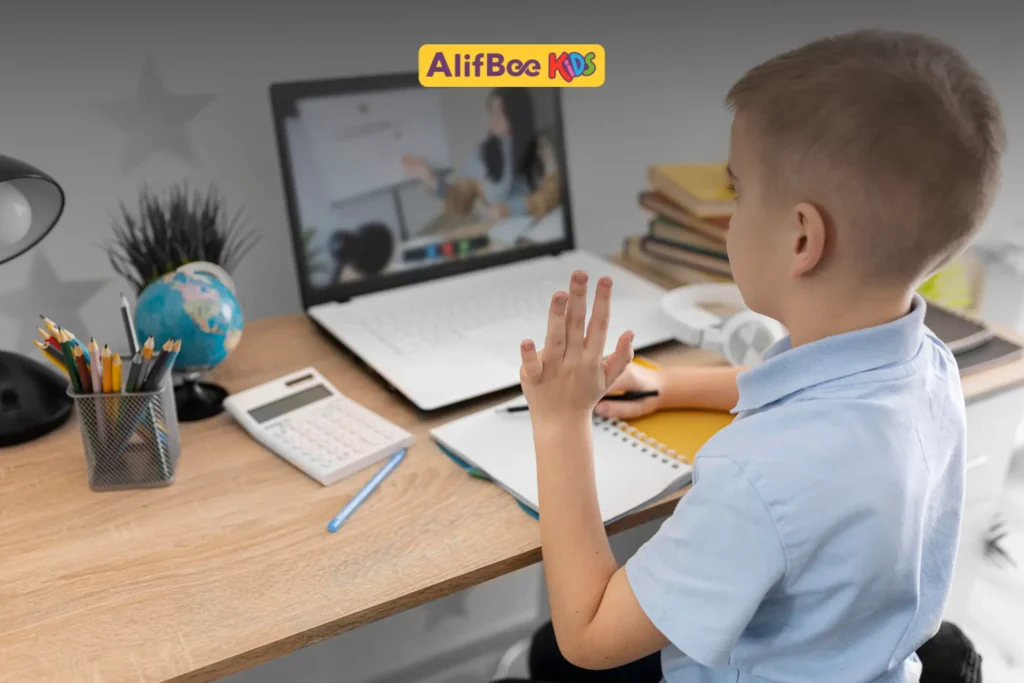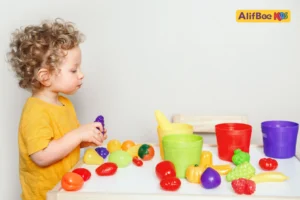To learn Arabic online for kids can be a fantastic way to open different avenues, and expand their minds in terms of communication, culture and also confidence. But, where to even begin picking the right online Arabic classes for kids? This article will break down where to start on your quest, and touch upon aspects such as teaching strategies, interactivity and what to think about in terms of teacher qualifications. This clear and practical guide can help you along the way!
Why Quality & Fit Matter
Let’s start with possibly the biggest consideration: quality.
It is surprising how much variation there is, and of course – the price does reflect quality.
So, the first route you can go down are the cheaper Arabic classes for kids. While this might be cost-saving, it may impact the overall long-term experience. These classes can cut corners with things like automated lessons and little personal interaction.
Example of Bad vs Good Class
Let’s see a side by side comparison of some aspects of a course that can differ between a bad and good class.
Bad Class
Good Class
Teaching quality: Hiring unqualified teachers with little personal interactions.
Teaching quality: Experienced, certified Arabic teachers, classes are fun and engaging.
Structure: No clear learning path or progress pointers.
Structure: A logical, age-appropriate curriculum that includes: speaking, writing, listening and reading.
Support: Little feedback or encouragement.
Support: Personalized feedback, one-on-one support.
Materials: Could be pre-recorded and/or outdated.
Materials: Games, visuals, stories to make Arabic more engaging.
Cost: Low prices but could be hidden costs (materials, advanced lessons etc).
Cost: Transparency, everything is included from materials to ongoing support.
Learning objectives: More of a short-term, memorization approach.
Learning objectives: Long-term confidence building, real life communication and skills.
Motivation: Could lead to boredom, frustration and lack of confidence.
Motivation: Your child feels comfortable in class, supported throughout and fosters a deep interest in the language.
(90 Day Korean, 7/12/2015, How to Choose the Best Online Language Class That Works for Every Language Style, The Teacher Treasury. )
Key Criteria to Evaluate an Online Arabic Class for Kids
So let’s go through each criteria of online Arabic courses for kids together:
Age-Appropriate Curriculum & Pedagogy
Let’s start with the age of your child, and then think about what’s out there that will fit them at this stage of their life. Lessons aimed at children will differ greatly from adult language classes; you will want activities like games, stories and songs where appropriate to make learning an interactive experience.
Ages 4-6:
Focus on listening and speaking (rather than reading and writing!). Think about songs, rhymes, and expressive colours and games within the lessons.
Ages 7-10:
You still need to focus on games and play, but simple grammar and basic reading and writing can now be a component of class.
Ages 11+:
Grammar and sentence building can take more of a role in class. Also, allow the students to undertake their own projects or tasks to develop confidence.
(Dunn, Opal, n.d, How Young Children Learn English as Another Language, The British Council.)
Qualified & Experienced Teachers
So who will teach your child Arabic? A few pointers to look out for.
You might have heard of a TEFL, but here you want to look for a teacher who has a TAFL (Teaching Arabic as a Foreign Language). On top of this, if a teacher has experience with elementary teaching or early childhood education, even better! They will keep the lessons fun and positive.
Now, you need to think about whether you would want your child to be taught by a native or non-native teacher. They both have distinct benefits:
Native teachers can offer:
- Authentic pronunciation
- Natural rhythm and intonation
- Cultural insights
Non-native teachers can:
- Explain concepts more clearly in your child’s native language
- Offer extra guidance to younger learners perhaps
A course that incorporates both could be a great option!
To really get a feel for online Arabic classes for kids, teachers might offer sample classes, reviews and testimonials, which can be very beneficial!
Class Format & Interactivity
So, there are a few options here. We’ll go through each one:
Live classes: Real time, direct interaction with the teacher.
- Pros: Good for children who need personal attention and structure.
- Cons: Time zone difficulties and schedule fits.
Pre-recorded learning: On demand classes, own time – own pace.
- Pros: Convenient, good for independent learners.
- Cons: Lacks the in-person on the spot interaction.
Hybrid programs: Some pre-recorded lessons mixed with some live classes.
Now, what about class size?
Group classes:
- Encouraging team work
- Practices listening to others
- Are better for games and interactivity
One-on-one classes:
- Focus is only on your child’s needs
- Teacher can adapt lessons to suit learning styles quickly
- Pace and goals entirely personalized
Maybe 2 or 3 students as a compromise!
We throw around the term ‘interactive classes’, but what does this look like, practically speaking? Let’s take a look:
- Digital whiteboards
- Online quizzes and or/polls
- Flashcards, videos, visuals
- Storytelling and songs

Think about a sensory experience for your child, this will help with their Arabic learning journey.
When it comes to frequency and length, the last thing we want is for your child to burn out. Shorter and more consistent lessons are more beneficial! Start with shorter lessons, and you can always build up. A couple of times a week is a good balance.
Thinking about the lesson content, recapping old material is essential, however new and challenging material is being presented to keep your child’s engagement.
Small Class Size & Individual Attention
The bigger the group, the less one-on-one attention for your child. This could also lead to less feedback, and potential demotivation. A class of six to eight students seems to be the sweet spot, large enough for fun group games, yet small enough so every student has a chance to practice and participate.
Balanced Skill Focus (Listening, Speaking, Reading, Writing)
Many classes place a heavy focus on reading and grammar, which are, of course, essential, but make sure your class involves communicative skills as well!
A great way to check if your child will cover all four skills is to see the syllabus for an overview. Seeing what type of homework provided can also be illuminating – is it purely grammar exercises? Or are there some speaking activities as well?
Progress Tracking & Feedback
Questions to ask:
- Are there regular assignments? Quizzes? Parental reports?
- Is the feedback and correction personalized?
- Are there any reviews, and goals to improve?
Flexibility and Scheduling
The main part here is, ensure the class is the right time and fit for your child. Think about time zones and how often you would like lessons to take place. An extra point here, inquire about the rescheduling/cancellation policy (it can vary greatly).
Cost, Trial, Guarantees & Refund Policies
Costs can vary widely. Anywhere from $15 to $200 per month. A middle ground, as with most things, is a good starting point. For example, a 45-minute small group lesson for around $30 is reasonable.
Additionally, check whether the price includes sample lessons, money-back guarantees, or cancellation fees. Will you have to pay extra for textbooks or platform access, or is everything included? These are all important details to consider.
Safe, Kid-Friendly Platform & Environment
Making sure your child can navigate platforms is essential. Another point, does the platform only work on the laptop, or on all devices?
When it comes to safety online, trusted platforms enforce strict privacy measures in order to safeguard children – number one priority.
Also on this point, how involved are you as a parent in the Arabic classes? Can you see your child’s progress, do you get updates?
Arabic Learning Apps as an Alternative to Online Classes
An app can be a great alternative, or indeed supplement to your child’s Arabic learning experience online or at home. AlifBee is a great app you can try with your child. It is filled with games, songs and animations designed specially for children, to keep them hooked and entertained.
Step-by-Step Checklist: How to Choose the Right Arabic Class For Your Kids
Here is a list of points we have covered today that can help you really specify what class you are looking for!

Common Mistakes Parents Make and How to Avoid Them
When it comes to online Arabic classes for kids, a few things to avoid to make the learning journey easier for everyone:
- Choosing just based on price
Price does not tell the whole story. Really understand what the cost covers and includes.
- No trial
The best way to get a feel for what classes will be like!
- Heavy learning schedule
Too much too soon can be overwhelming. See how your child gets on with classes, you can always build up slowly.
- Not verifying teacher quality
It’s important to check credentials!
- Not enough speaking practice
Reading and grammar are vital, however ensure that speaking is also part of class.
- Not considering platform interface
This can make or break the motivation to want to engage with lessons and Arabic itself.
We hope that our guide has given you confidence when searching for online Arabic classes for kids.
Why not delve a bit deeper in the Alifbee blogs, including how to help your child’s Arabic practice at home.
Happy Arabic learning for your little ones!





